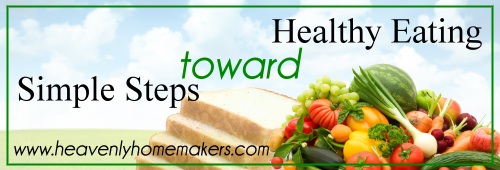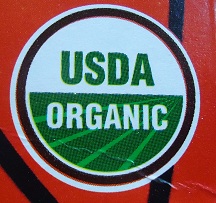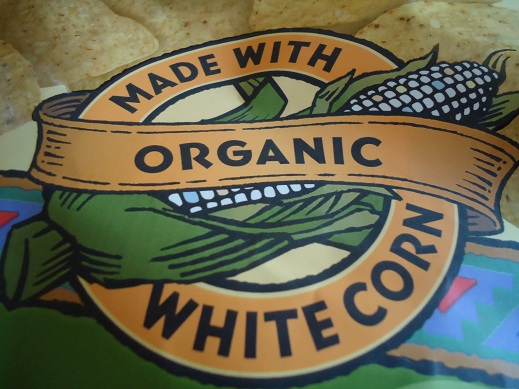
Disclaimer: I know and love many farmers who do not raise their crops or animals organically. I do not think these people are evil, so there. I’m not going to say that eating organic food is the ONLY WAY and the BEST WAY. I’m just sharing a bit of my knowledge based on research, but not based on my own expertise. The only thing I’m an expert on is running into walls when I’m tired. So read these posts and do with them whatever you want to do with them. Research organic practices on your own before reaching any conclusions. And be sure to watch out for walls when you’re tired.
Be sure to read Part One and Part Two of this series if you missed them!

What does the “Organic” Food label mean, anyway?
Organic foods are foods that:
- Are grown or made without synthetic pesticides or chemical fertilizers
- Do not contain genetically modified organisms (GMOs)
- Are not processed using irradiation
- Do not have chemical food additives

Why do I feel like eating organic food is important?
I like knowing that much of my food has been raised in a safe environment. I appreciate that organic farmers are being careful to sustain healthy soil and water. I appreciate that the food I offer my children is less toxic than some non-organic foods. I like knowing that our food is non GMO, as in, our food is real. Genetically modified food is scary and our bodies don’t like it. In addition, I like knowing that my food has not gone through the process of irradiation, which is essentially done to make it last longer on the shelves and to kill bacteria. Ever had fresh vegetables last forever in the fridge without changing colors or getting yucky? Chances are it was irradiated. (Fresh food is supposed to spoil, not last forever in your fridge, by the way.)
Is it worth it to pay more money for organic food?
That depends on what it is, and I’ll talk more about that in the next post. BUT, I guarantee you that raising food organically costs more than raising food conventionally. Therefore, if you trust the provider of your food, and are convinced that you need to eat an organic variety of that particular food, then YES it is usually worth it to pay more for organic food because you are paying for much higher quality food. For instance, I don’t mind paying more for Organically Grown Nuts. We actually visited Braga Farm, our favorite source for organic nuts, and learned about their practices and saw how they do things. After this tour, their prices seemed completely reasonable to me. We can’t expect someone to work extra hard and not be compensated for it. I also don’t mind paying more for our eggs, meat and milk because I trust the people raising these animals and the quality of the food we get from them is excellent!
When is it NOT worth it to pay more for organic food?
Well, as organic food has become more popular and more “in demand”, I see more and more “organic processed foods”. It’s pretty tough for me to pay $3.75 for a package of six Organic Cookies. Most of these organic processed foods do at least contain better ingredients than their non-organic counterparts, but not always. Just because something has an organic label doesn’t necessarily mean it’s healthy. Healthy-er, maybe. But offering much nourishment? Maybe not. Might it be a fun option for a treat sometime? Sure. But don’t get sucked into buying something just because it’s organic. ;)
Do your homework. Don’t pay more or buy into the “all natural” or “organic” label always being better. There’s this little tool called the internet that is very helpful in researching companies to see what they stand for. Hey, what a great time to use the Swagbuck search engine. :) Or, if it’s a local farm you’re looking to buy from, ask lots of questions about how they raise their crops and animals before you decide if it’s worth it to pay more for their food.
Coming up next in this series: Which foods are the most important for organic purchasing (and which ones can I skip)?

Loving this series Laura. Organically grown food is very important to me too. Knowing that it is the best quality we can get & that there is no gmo/pesticides is very very important. The price can be a huge issue though. In particular I am finding the price of coconut oil hard to swallow. I can get extra virgin coconut oil locally for €4 or organic extra virgin for €10 for the same size jar. Ouch!!
GMO’s cause allergies, eczema, infertility, birth defects, still births, organ damage, cancer, and more!
For people wanting more information on GMO’s (cloned foods), please go to http://www.SeedsOfDeception.com or google “Jeffrey Smith”.
I’ve found that organic salad mix lasts twice as long as non-organic in the plastic bags.
One thing to consider (and maybe you already addressed this, and I missed it, or you’re going to address it later), is that some small farms can’t afford the expense to get the “official stamp of approval” to be able to say they are organic. The organic stamp is helpful in the grocery store, but for locally produced foods, talk to the farmer, find out how he grows his food, or raises his livestock, and decide accordingly based on his practices, not whether or not he went through the government process to get an official organic stamp.
Yes, I’ll definitely be talking about this in future posts! Most of the organic farms I purchase from are not technically organic. I just know how they produce their food!
Silly question from a newbie: How do you know if food contains GMOs? Will it say so on the package?
Unfortunately, nothing is marked warning you of GMOs. Many foods that AREN’T GMO will say so on the package. In a future post, I’ll be discussing further which foods to avoid that are typically GMO.
Thank you so much! I’ll stay tuned for future posts to learn more!
If you give me your address, I would more than gladly mail you a brochure that tells you what ingredients are GMO’s! Or you could go to http://www.nongmoshoppingguide.com and download it for free or buy the brochures in bulk (really cheap) to hand out to friends!
Thank you! I downloaded the document and it will be very helpful.
Thank you so much for all of our time sharing what you know with us. You are such a blessing to me! Please know how appreciated what you are doing is. If I could only follow one blog, it would be yours! May God continue to bless you and yours.
Your blog has been such a blessing to me and my family. I have been on a mission the past two months to totally change the way we eat. We are doing great but I have a question about eggs…I’m hoping you can help. I have been buying organic eggs from whole foods for $4.69 a dozen. I just found a guy that has chickens on his land and sells the eggs for $4.00 a dozen. The chickens are well kept and feed fresh feed but it’s not organic feed…which means that they are eating feed with GMO corn in it. So which is better…eggs and chicken that are organic but not local OR eggs & chicken that are fresh from a local farmer?
Oh boy, tricky one. If they’re being fed GMO corn, I would say it’s not really worth paying $4.00/dozen. But since they are fresh from a local farmer…that’s such a good thing. I think I’m not much help on this one. I think both options are probably okay and obviously much better than regular ol’ eggs.